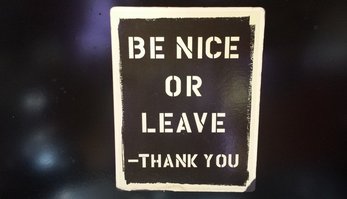 If you have been following the postings I have been making you know that by being Pleasantly Persistent you will have a success rate much higher than other people in our profession. There are also some other benefits to your Pleasantly Persistent efforts. First, if you take the time to study the client each time you make a call, by the time you actually get through to the client you will know much about their business. Secondly, they will respect your tenacity. And thirdly, they will probably have built a positive image about both you and your company. However, there are just some people and companies that you cannot get to respond to your cold calling efforts. This, however, does not lessen your responsibility to get in front of the prospect and make them a client. So, what are you supposed to do to put yourself in the room with the decision makers? 1. Pray. This is the method that most people use if their cold calling efforts don’t work. While the power of prayer is all around us, I could venture to say that this is not the best use of prayer. Prayer should be used for something much more important. Find a different catalyst that will get you doing something, almost anything. While I was in a retail store I would change a display. While I worked in the B2B business I would go to the kitchen and cook something for someone else. Just create activity, you will get better results and your mind will be clear to follow the suggestions below. 2. Work your various networks. See which of your contacts knows someone at your target company. One of our top sales people at Buxton created a process out of this that he worked every day. He would tell people that he never cold called, but he constantly worked on his personal contacts and spent a lot of effort learning and logging who was working with who and their job movements. This master of networking also made many new friends along the way. A year after he began this method he had more than doubled his income. If this is your plan be diligent and don’t try to fool yourself, it never works. 3. Use a cold call service. There are hundreds of them available. You have to determine what image you want to leave with the prospect to determine which service you want to use. Some of them are located here in the US and some are operating out of the country. Some of them use robo-calling techniques and some of them use actors. You will most likely get decent results at the beginning of your program. But, unfortunately, these results are normally short lived. 4. Increase your efforts at Trade Shows. For most companies trade shows are a huge use of resources and the ROI for shows are never measured. The reason for this is pre-show lack of preparation. To make a Trade Show worthwhile, you have to do all of the pre-show preparation.
5. Keep your company in front of the prospect. Make a schedule to send an article about something the prospect should be interested in. Make a rhythm of your efforts. Monday is a bad day to send anything to a prospect as it will get overshadowed by everything else Monday brings. But any other day is just fine. Make the article about growth or problem solving. And make it real, academic articles, while interesting, will not get read by most retail executives. 6. Explore Axcelora. Axcelora is a new service that is being offered to B2B companies that are looking to gain traction in both the retail and restaurant industry. What makes this company unique is the way they go about setting appointments for their clients. Through their network of veteran retail and restaurant executives, Axcelora Partners call their colleagues and make personal introductions and appointments. They take the time to learn enough about your business to be able to set the appointment without trying to make the sale. At this point, Axcelora is the only company that has built this type of network and offers this service
0 Comments
 In December of 2000 I made a significant career change. Prior to that time I had worked for only two companies, Radio Shack/Tandy Corporation and Cash America. I had either been responsible for the entire operations of the business unit or I ran store operations. While handling those responsibilities I never had the need to call a company and sell our services; I was the one that companies called upon. At Tandy, we had a non-written rule that all phone calls were returned before you went home that night. Mr. Tandy did it, and so would the rest of us. It was just the right thing to do, and I assumed that everyone followed that practice as well. When I joined Buxton, I quickly learned an important lesson. When I joined I asked Tom Buxton if I could just sell. I had had all the leading and supervising of people that I thought I wanted for the rest of my life. Tom was happy to oblige me. At that time at Buxton we did not have territories, industries, or even companies that we were assigned. We actually had many people calling on the same company, so whoever could get in the door would get the business. So I found one of our databases on retail and quickly picked out retailers within Texas that I wanted to call on. It did not look like anyone else in the company was calling on them so I got to work. I figured this was going to be easy. I would call the proper executive (it was in the database and that had to be up to date :) ) tell them my background, they would meet with me and we would help them with their business. All very logical. But there was one fly in the ointment, one chink in the armor, one bump in the road, one hitch in the giddy up. No one returned my call. No one cared that I actually knew about their business, much less had actually been in one of their stores. They did not know how we could help them profitably grow their business because they NEVER returned my call. NEVER. I did not get it. And, if by chance, I reached an admin (the evil gate keepers), I would get the polite, but none the less fatal, “I will have them call you back.” It never happened. If I did not get to speak with the right person right then, I was not going to get a call back. Did these people not get the memo, didn’t they know they were supposed to call back everyone every day. I will admit that it took me a month or so to stop being angry with these executives. It took me time to realize they lived in a different culture than we did at Tandy and that I was not going to change their culture. However, I still had a responsibility to my friend and family to be successful and if people did not call me back, I had to devise a different tactic to gain access to them. Thus was born the new campaign for access to decision makers. Now, before I tell you this secret that works, I will tell you that, even with the secret spelled out, most of you will not follow it. It will work 80% of the time. I proved it my last year and a half at Buxton by defining 100 companies that we wanted to penetrate with an appointment with a decision maker. Within the next 18 months we were in front of 80 of those decision makers. In the B2B world that is great success. So, it works, it is simple, and I know that the largest part of you will not follow the advice I am about to give you. You won’t follow the advice because you have to park your ego at the curb, and most sales people forget the objective of the exercise is to make sales and can’t park their ego. The secret is Pleasant Persistence. That is it in a nutshell. You have to be Pleasantly Persistent. I cannot tell you how many customers have told me that they took my call because I always left a pleasant message and I always continued to call back, even without getting a call back. So, how can you stay Pleasantly Persistent when you are being ignored? 1. Realize that it your job to get in front of them, it is not their job to have a meeting with you. (Although I think it is their job to meet with you but that is a subject for another discussion). 2. On average it takes 7 calls to get to speak with someone. Most people stop at 2. If you keep going you are going to stand out just because people admire persistence. 3. There is no other option than being pleasant. You can’t call up a prospect and leave a message berating them for their lack of calling you back. You can’t be sarcastic to them; you don’t know them well enough to do that. You can’t threaten them by going up the ladder; that will certainly kill the possibility of a sale even if you do get to see them. So, you might as well be pleasant. 4. Constantly think about how you can help THEIR company with your product or service. I promise you that will come across as you leave your 7th voice mail. 5. Use your CRM tools to politely remind you that it is time to call people. If it is on your To Do List you are more likely to get it done. 6. Rejoice when you do get to talk with someone and let them hear it in your voice. People love to be around a winner and you just won where 90%+ of people would have given up. So, it is a pretty big secret, but don’t worry about getting it stolen, because no one else is going to use it. They just won’t. If you become an advocate of our Pleasantly Persistent approach you will be leading the parade. Now if you don’t want to be Pleasantly Persistent but still need to get in front of decision maker reach out to Axcelora as we can do the job for you.  I think you have all heard of the movie Pollyanna starring Haley Millis (1960). This positive movie about overcoming obstacles that are put in your way by life and circumstances has always had a special place in my heart. You see, although I was a hard core electronics retailer of the 70’s, 80’s, and 90’s, I always thought that things could get better if you could keep a positive attitude. That mind set has served me well in overcoming the challenges that are simply part of life. I have always looked for that silver lining that Pollyanna looked for in her Glad books. When we started discussion about Axcelora one of the things we determined was that we were going to be a Pollyanna Company. We were going to be that great place to work that people often talk about but never quite get there. In my mind that did not necessarily mean a place with lavish perks (after all, we had not sold anything yet) like Nap Rooms (that would be my first perk), massages every Friday, endless snacks, or free travel. It also did not mean that we would have to walk around the office singing Kumbaya and hugging each other. And, oh yes, it did not mean we would have to be politically correct. What it did mean was we were going to completely tolerate and respect each other- gender, preferences, religion and all of the things that get folks excited would be accepted and respected at Axcelora. We would be able to talk politics, religion, world events, even work because we would be building a culture of knowledge and respect. To me these are the principals of Pollyanna. What are they key principals to building this Pollyanna culture? I have thought long and hard about this and have come up with the three things that are working for us right now. 1) Have mutual respect with the people you associate with. I have known the people in the core of our company, the people that have come up with the ideas that are powering Axcelora, for many years. And, we have all come together in this venture/adventure because we respect each other. We come from all different backgrounds but we all have one thing in common; we are accepting and respectful of each other. Our values are all similar even though we may have differing religious and political backgrounds. We have three women and four men on our original team, giving us different points of view on varying subjects. 2) Communicate well. If one of us has done something that is dumb (usually me) the rest of the group is very comfortable expressing their opinion on the subject. This can be written (email, text, note), verbal, or just a look that usually says it all. We communicate well because we respect each other. This has allowed us to eliminate silos. It was established early that everyone could play in each other's sandboxes. We are trying to build a company and build it right. If we see something wrong, we stop and fix it. No one’s feelings get hurt because we respect each other's intelligence, commitment and attitude. 3) Only bring nice people to the party. We established, from the start, that the Axcelora brand is unique and has unique attributes. Since our only assets are the connections our Partners have, we knew we had to have only Partners that are nice. While there are many people that can bring connections to our project, some of them we cannot afford simply because they might think less of our Pollyanna culture. So we have vetted every single new Partner to our group (30 and counting).) We called references to insure our new Partners were nice. We know they are well connected, but we want to insure they are well thought of in their work and will fit in with what we are building. By making this a keystone to our strategy we are confident that Pollyanna will live in our culture. So far, our plan seems to be working. The team we are building is helpful to me and to each other. The effort they have made in fulfilling our customer needs is more than I ever thought would happen. Time will tell how well this Pollyanna idea plays out, but we are off to a good start. If you want the business world to take on this Pollyanna type of culture share our post with your friends. |
AuthorRich Hollander is a retail expert with over 40 years in the industry. Archives
September 2021
Categories |
© Copyright 2016 Axcelora, LLC.
All rights reserved.
All rights reserved.

 RSS Feed
RSS Feed